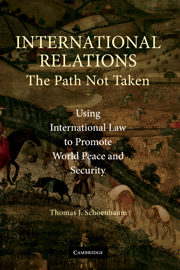Book contents
- Frontmatter
- Contents
- Preface and Overview
- 1 Introduction: Two Very Different Wars in Iraq
- 2 The Twenty-First Century – The End of History or a New Beginning?
- 3 International Power Politics
- 4 A New Global Order Based on International Law and Multilateralism
- 5 Peace and Security: Reinventing the United Nations
- 6 International Political Economy
- 7 International Environmental Protection
- 8 International Human Rights
- 9 International Crimes
- 10 Conclusions
- Index
- References
3 - International Power Politics
Published online by Cambridge University Press: 23 July 2009
- Frontmatter
- Contents
- Preface and Overview
- 1 Introduction: Two Very Different Wars in Iraq
- 2 The Twenty-First Century – The End of History or a New Beginning?
- 3 International Power Politics
- 4 A New Global Order Based on International Law and Multilateralism
- 5 Peace and Security: Reinventing the United Nations
- 6 International Political Economy
- 7 International Environmental Protection
- 8 International Human Rights
- 9 International Crimes
- 10 Conclusions
- Index
- References
Summary
THE STATE SYSTEM
The world of the twenty-first century is a world of sovereign states. We take for granted that the state system is the basis of political order on the planet, the primary organizing principle of world politics. The territory of the earth is divided among 193 states having the attribute we call sovereignty. (The precise number of states is, of course arbitrary: In 1945 there were 53, and in 1700 there were about 2,000). In principle, all lands, inland waters as well as islands, and large expanses of ocean waters are included in this political system. Only the so-called high seas and the continent of Antarctica, to which a special regime applies, are outside national jurisdictions. The territorial and maritime frontiers among states are the products of both history and agreement.
The state is so dominant today that we tend to forget this was not always the case and that the state system is not an immutable feature of the world. There are in theory manifold ways of organizing civil society; history is littered with the wreckage of all sorts of political entities that have existed, many with great success: empires, commonwealths, city-states, colonies, and various feudal structures that have come and gone on the world stage.
The contemporary state system was not decreed or invented – it evolved over hundreds of years. Its origin was in Europe in the early modern period.
- Type
- Chapter
- Information
- International RelationsThe Path Not Taken, pp. 35 - 53Publisher: Cambridge University PressPrint publication year: 2006



